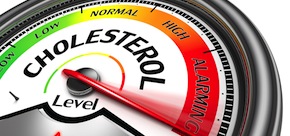Many myths and fallacies surround cholesterol. So we aim to provide some clarity around this major health concern.
What is cholesterol?
Cholesterol is a white, fatty substance found in your blood, which doctors usually call blood lipids.
Your body is very efficient at making its own cholesterol. Mostly, it’s made by the liver, but other cells can make it as well.
Why does my body make cholesterol?
Believe it or not, your body uses cholesterol for vital functions, such as:
- building the structure of cell membranes (the outer, protective casing of cells)
- making hormones
- making vitamin D
- producing bile acids, which are important for digesting fats and absorbing nutrients.
The thing is, your body doesn’t need much cholesterol to perform these functions. However, our modern lifestyle makes it too easy to eat cholesterol-rich foods and primes our bodies to make much more cholesterol than what is actually needed.
How does cholesterol behave in your body?
Cholesterol is a waxy substance that doesn’t dissolve in blood. To be carried around the body and do its work, cholesterol binds to proteins in the blood. Once bound, it is call lipoproteins.
There are two types of lipoproteins; you may have heard these described as ‘good’ and ‘bad’ cholesterol. Medically, they are:
- Low-density lipoprotein (LDL) – LDL carries the cholesterol from your liver to the cells that need it. But if there is too much LDL, it will build up as plaque along your artery walls and increase your risk of heart disease. That’s why LDL is called ‘bad cholesterol’.
- High-density lipoprotein (HDL) – HDL carried cholesterol away from your cells back to your liver. In the liver, it is broken down and passed out of the body as waste. That’s why HDL is called ‘good cholesterol’.
What should my levels be?
Generally, when your cholesterol level is tested, you will usually receive three numbers – one for each of your total cholesterol, LDL and HDL.
For each litre of blood, health authorities usually recommend that the levels be no more than:
- Total – 5.5mmol for adults without risk factors
- HDL – preferably 1mmol or more
- LDL – 2.5mmol for adults without risk factors; 2mmol for at-risk adults.
Sometimes your triglyceride levels may also be measured. After you eat, your body digests the fats in your food and repackages the fat as triglycerides, which your body uses for energy. Any excess triglycerides are stored as fat, and can increase the risk of heart disease. Ideally, it is recommended that your triglyceride levels be no more than 1.5mmol per litre of blood.
If you’re aged 45 or more, the National Heart Foundation recommends you have your cholesterol levels tested regularly.
Stay tuned for next week’s article on how to manage your cholesterol levels.
Learn more:

